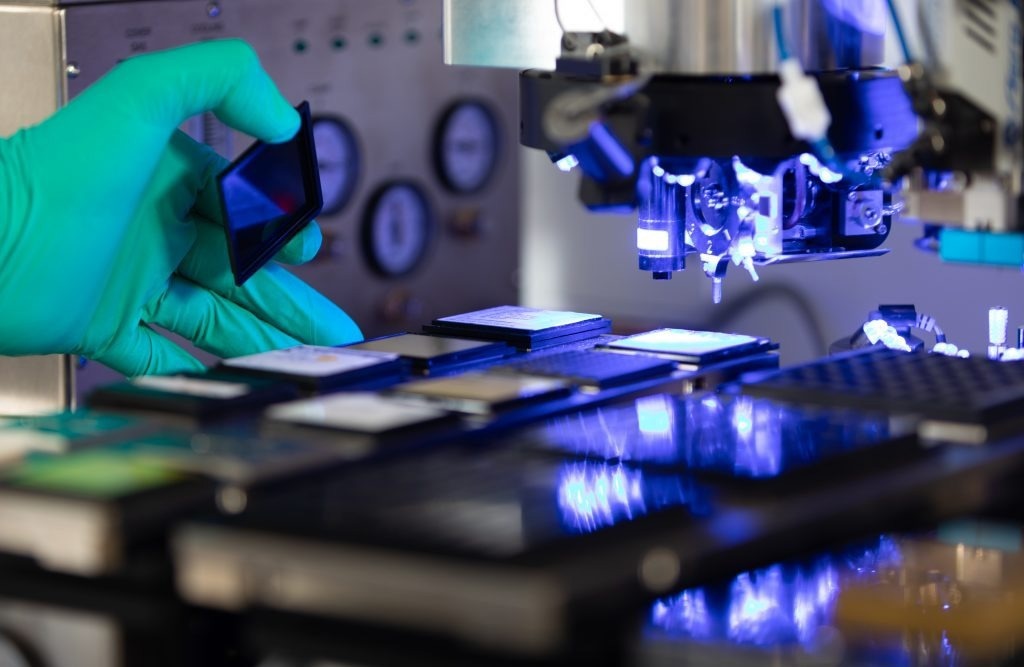South Devon College bags ½ £million unprecedented opportunity to nurture the future of photonic semiconductors.
 Loading fully automatic Palomar 3880 precision component placement system in EPIC Centre prototyping lab. Image Credit: John Coombe (Bay Photonics)
Loading fully automatic Palomar 3880 precision component placement system in EPIC Centre prototyping lab. Image Credit: John Coombe (Bay Photonics)
In a milestone for UK science and technology, South Devon College, a further and higher education college in Paignton has landed a ground-breaking partnership with Bay Photonics, a photonics packaging specialist and Davies & Bell, a microelectronics bonding specialist. bringing a beacon of innovation to Britain's south west shores.
Together, they will be the educational stronghold in the revolutionary Photonic Integrated Circuit Packaging Academy (PICPAC) project, a seminal venture in the burgeoning field of photonics.
Dr Andrew Robertson, Chief Technical Officer at Bay Photonics said: “South Devon is recognised nationally as having a cluster of specialist semiconductor photonics companies. this project is focused on providing semiconductor training skills that the UK semiconductor industry is crying out for to ensure we remain competitive in this strategically important and rapidly growing market.”
But What is Photonics?
To put it simply, photonics is the science of light. It uses photons – particles of light – rather than the electrons used in traditional electronics,. From laser surgeries to ultra-fast broadband, photonics is the invisible force powering our world.
And it's not just in laboratories or Silicon Valley start-ups. Photonics touches every corner of our lives. It's in your smartphone, the internet, your car's sensors, the supermarket barcode scanner, even the fibre optic cables beneath our streets. Without realising it, photonics has become an integral part of our modern lifestyle, shaping how we work, play, and connect.
PICPAC will be a pioneering educational venture, set to fill a crucial gap in the UK's technological landscape. Photonics are in high demand globally and underpin almost every electronic device on our planet. Yet, despite recent investments in the semiconductor sector, there's been a significant shortfall in practical knowledge and training in assembly, packaging, and testing (APT) - critical steps in bringing these semiconductor devices to the market.
And here's where the importance of PICPAC becomes clear. It will create and deliver bespoke courses on these very aspects of photonic packaging that have been neglected until now.
South Devon College will deliver these courses in formats and schedules tailored to suit the industry's needs, from 1- and 2-day professional short courses to a full-time degree - a UK first, transforming the college into a national centre for semiconductor photonic packaging training.
Dr Roger Hopper, Skills Development Coordinator for Engineering at South Devon College said: “Partnering with Bay Photonics and Davies & Bell, industry leaders in the tech arena, SDC will capture industrial training requirements and translate them into course content. In doing so, we will help to ensure that Devon, and the UK is at the forefront of this technological revolution.
“The UK has been a global leader in key parts of the semiconductor supply chain, a legacy which the PICPAC project is poised to reinforce. With these educational courses, not only will we boost our workforce's skills, but we also secure our future in the global technological race.”
Dr Robertson added: “With average salaries in photonics 67% higher than the national average, a career in the photonics industry can be both rewarding and fulfilling. As South Devon has a cluster of companies developing and manufacturing photonics products, the skills needed are diverse, with highly skilled operators and technicians as well as engineering, development and management staff required. A graduate photonics engineer could expect a starting salary of around £28,000 in South Devon.”
In addition to enabling everyday conveniences, semiconductor photonic devices are crucial in cutting-edge technologies such as quantum computing. These will be the game-changers of tomorrow, dictating the future of telecommunications, data communications, and imaging.
Dr Hopper Said: “By investing in education and training, the PICPAC project will ensure that these chips are packaged to operate in real-world applications, keeping the UK at the helm of this rapidly growing field.
“With Bay Photonics, and Davies & Bell we are stepping forward in a brilliant initiative, showcasing British prowess in this global arena. By leading in photonics, we aren't just lighting up our corner of Devon – we’re illuminating the future for all of us.”